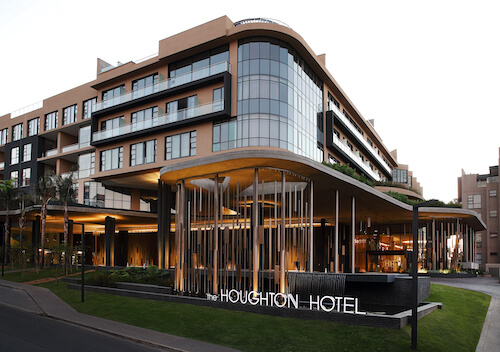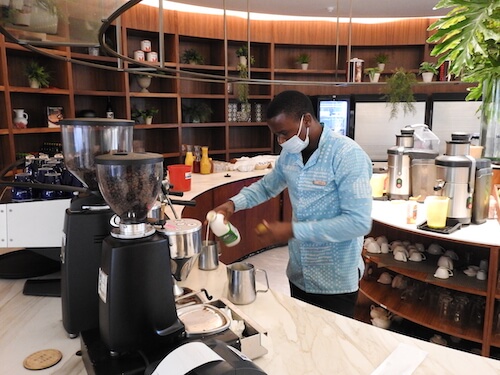 In a five-star hotel, the quality of the service is as much a part of the experience as the fabulous facilities and gorgeous décor.
In a five-star hotel, the quality of the service is as much a part of the experience as the fabulous facilities and gorgeous décor.
That’s why I was surprised when the young man taking my drinks order at The Houghton Hotel in Johannesburg wasn’t familiar with a Steelworks. I discovered why later. Almost 10% of the staff here are trainees, probably in their first job and with no previous hospitality coaching.
The hotel’s CEO Arnold Forman cares enormously if the guests have any reason to complain, of course. But he cares even more about giving township youngsters a chance to carve out a career and become economically independent.
High-spending guests don’t expect to interact with staff fresh from township schools without any five-star finesse, and there have been a minor mishaps, he admits. “Obviously from a brand perspective it has its repercussions. It’s a risk, because you haven’t gone to hotel school, you’re not polished, you’re coming here straight off the streets and we’re giving them an opportunity. So I could damage my brand by bringing in youth that aren’t trained. But if you don’t give these kids a job, how are they going to get the experience to help them get a job going forward?” he says.
 The hotel tries to educate its guests about how it’s doing its bit for society and some guests adore the youngsters, he says. Others have given critical guest reviews, but as the first year draws to a close, The Houghton Hotel Academy will soon welcome its second batch of 20 novices.
The hotel tries to educate its guests about how it’s doing its bit for society and some guests adore the youngsters, he says. Others have given critical guest reviews, but as the first year draws to a close, The Houghton Hotel Academy will soon welcome its second batch of 20 novices.
The Houghton Hotel was voted Africa’s Leading New Hotel in 2020 in the World Travel Awards and the Best Hotel in South Africa 2020 in SA’s Finest, a publication by The Tourism and Hospitality Counsel. So it has a lot to lose – but its industry-leading internship scheme seems more likely to enhance its reputation than tarnish it.
The bold move was also inevitable, given Forman’s background. The scheme is run in partnership with Afrika Tikkun, a non-government organisation founded in 1994 by Chief Rabbi Cyril Harris and philanthropist Bertie Lubner to mend a society broken by apartheid. Forman, the CEO of the Lubner family’s investment business, was also brought on board.
Afrika Tikkun has grown to offer a cradle-to-career approach, with creches, and centres where kids can get a meal, play sports, use computer labs, while its Afrika Tikkun Services division focuses on vocational skills training. What’s going to happen to this country if its most energetic and productive generations are sitting at home bored, frustrated and aimless, Forman asks.
 In the intervening years, his own career had taken a twist. The Lubners were involved in The Houghton, a planned development of elite apartments and a hotel that tanked in the 2009 financial crisis. Forman was seconded to rescue the unfinished project, and once it was complete, he led a management buyout of the hotel and became its CEO. That allowed him to create the work experience academy, with year-long training that includes workshops taught by professional hoteliers, plus hands-on experience in the reservations, accounts, housekeeping and food and beverages departments. At the end they receive a letter certifying that they have trained with a world-class hotel, giving them a priceless career boost.
In the intervening years, his own career had taken a twist. The Lubners were involved in The Houghton, a planned development of elite apartments and a hotel that tanked in the 2009 financial crisis. Forman was seconded to rescue the unfinished project, and once it was complete, he led a management buyout of the hotel and became its CEO. That allowed him to create the work experience academy, with year-long training that includes workshops taught by professional hoteliers, plus hands-on experience in the reservations, accounts, housekeeping and food and beverages departments. At the end they receive a letter certifying that they have trained with a world-class hotel, giving them a priceless career boost.
Since Zinhle Ngcobo (29) already held a diploma in financial management she found her niche in the finance department. After a few months of focusing on procurement and stock, she was able to train up two other youngsters. She’s now one of three interns to be kept on permanently, and her position will let her support her younger brother financially.
Ngcobo had spent three years applying for jobs before she heard about the NGO. “It was the best thing that’s ever happened for me because I really started to grow and I’m still growing,” she says. “It’s a nice environment and the people are very friendly. They make sure we Afrika Tikkun people are groomed because they’re willing to help us grow.”
 The CEO of Afrika Tikkun Services is Onyi Nwaneri, a vibrant Nigerian whose energy and passion for South Africa are boundless. She screens the youngsters first before they join its vocational training schemes, and finds only about one in five shows enough interest and commitment to be selected.
The CEO of Afrika Tikkun Services is Onyi Nwaneri, a vibrant Nigerian whose energy and passion for South Africa are boundless. She screens the youngsters first before they join its vocational training schemes, and finds only about one in five shows enough interest and commitment to be selected.
Initially Ngcobo wasn’t one of them, until she followed Nwaneri down a corridor begging to be accepted and promising not to let her down. “Sometimes you have diamonds around you and you don’t know it,” Nwaneri says. “She’s got a permanent job now because she was given an opportunity and she wanted to change her life.”
Two things are remarkable about the Houghton Hotel Academy, Nwaneri says. One is that it was created during the Covid lockdown, when most hotels closed or were retrenching and focusing on survival. The second is how it’s embraced people from disadvantaged backgrounds.
“Normally most hotels of this nature only want top class individuals - only the best from the best chef schools and only the best from the best hospitality schools,” she says. “Walking around this hotel are individuals whose lives were going nowhere, and because of the courageous CEO we have people whose lives have changed. We have a dream that any child will be able to experience a life that’s different from the one they were born to.”
Afrika Tikkun’s goal can only succeed if more companies partner with it to run programmes that give young people skills and experience in various fields.
Forman himself doesn’t want the Houghton Hotel to be the only one feeding youngsters into the hospitality trade, but efforts to engage with other hoteliers to replicate the scheme have gone nowhere. Perhaps if the Houghton Hotel keeps winning awards, that attitude will change.
For more details see www.thehoughtonhotel.com and www.afrikatikkun.org
(First published in Business Day)